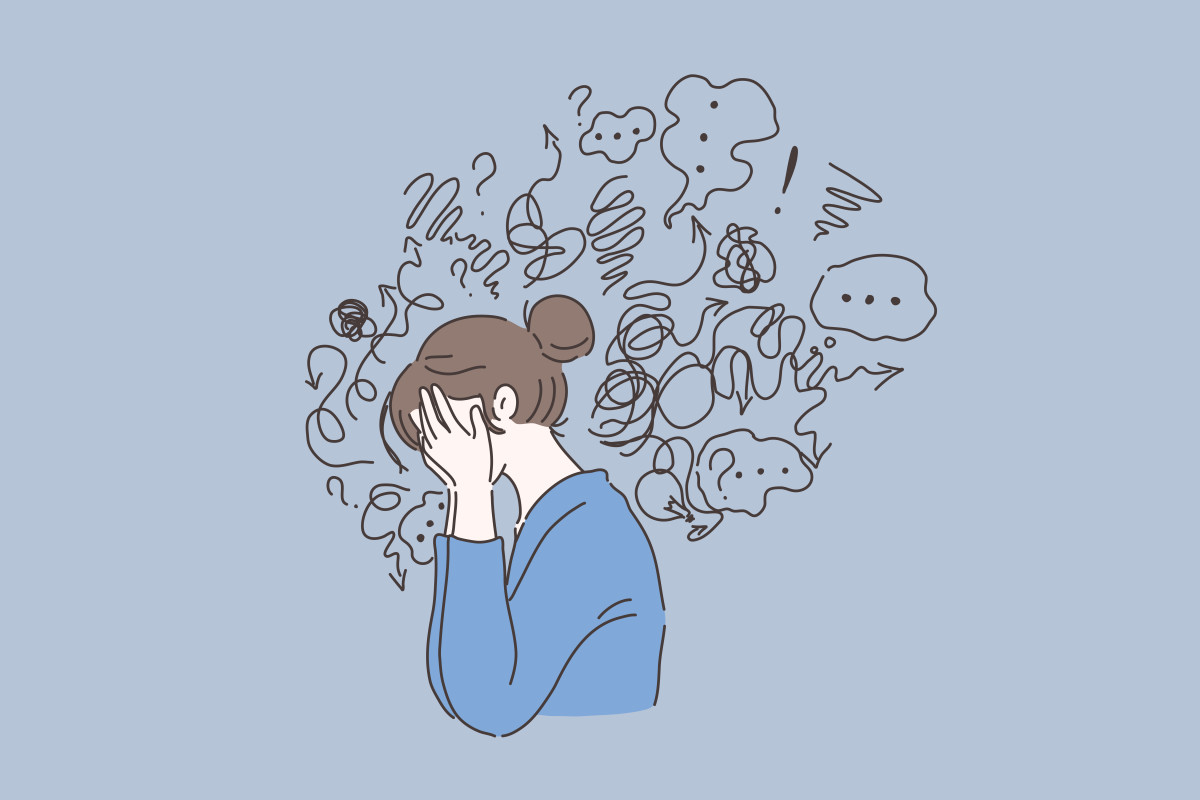Depression - What You Need To Know
Depression is a Treatable Disorder
Depression can be a debilitating mood disorder that makes you feel sadness, and loss of interests. It affects about 6% of the population. It is more common in woman than men. Depression appears to be caused by many factors including both genetic and environmental factors. Its heriability is moderate at 35%. Environmental factors such as sexual, physical abuse in childhood can increase the risk of depression. There are known changes in the stress-responsive system, and brain structures as well as the presence of inflammation that are seen in depression. Diagnosis is based on the presence of five symptoms out of the nine listed in DSM V. There are effect treatments for depression including psychotherapy and pharmacotherapy. Electroconvulsive therapy is often effective in drug resistant depression.

What is Depression?
Depression is a mood disorder that causes you to feel persistent sadness, with a loss of interests, and changes in cognitive function (executive function, memory, and attention). You may also experience disturbed sleep or appetite. Those of us with depression are at higher risk of developing conditions such as diabetes mellitus, heart disease and stroke. Depression can also lead to death by suicide.
How Common is Depression?
Depression affects about 6% of the us worldwide each year. Women are twice as likely to develop depression than men after puberty. In both genders, the median age of onset of depression is about 25 years. The peak risk period for depression ranges from middle- to late-adolescence to early 40s.
What Causes Depression?
The cause of depression is not fully understand and there is no established mechanism (the factors and processes that lead to the disorder) that can explain all aspects of depression. However, it is believed to be multi-factorial with both genetic and environmental factors involved.
Do Genetics Play a Role in Depression?
It is well known that depression clusters within families. If you are a first-degree relative of a depressed person, you are about three times as likely to develop the disorder as the general population. The heritability, or the degree that genetics can explain the trait, is about 35%. For comparison, schizophrenia has a heritability of 80%. The "search for main genetic effects in [depression] so far has not revealed consistent or replicated [major] findings." It appears that the "risk of [depression] is highly polygenic and [likely] involves many genes with small effects."
Does the Environment Play a Role?
Life stressors can often trigger the development of depression. "Traumatic events such as the death or loss of a loved one, lack or reduced social support, caregiver burden, financial problems, interpersonal difficulties, and conflicts" are some of the "stressors that can trigger depression."
Exposure to adverse events in childhood can put you at risk for developing depression. These events include physical and sexual abuse, neglect, exposure to violence or early separation from parents due to death or separation.
What is the Hypothalamic-Pituitary-Adrenal (HPA) Axis?
The biological system that mediates the stress response is altered in depression. Cortisol, a stress hormone, is high in patients with depression. Moreover, elevated cortisol is a risk factor for depression in high risk individuals. Although, there are unquestionable changes in the HPA axis in depression, attempts at modifying this system has not led to new therapies.
Is Inflammation Involved in Depression?
There is somewhat moderate evidence that inflammation may play a role in depression. Most of the evidence comes from animal studies, but there are a few human studies that support this idea. A population-based study has shown that both prior severe infections and autoimmune diseases raises the risk of subsequently developing depression. Patients with depression were observed to have higher blood levels of cytokines such as tumour necrosis factor and IL-6. In a few studies, high levels of IL-6 during childhood significantly increases the risk of becoming depressed in adulthood.
What are Monoamines?
Monoamine neurotransmitters are serotonin, noradrenaline and dopamine. These brain signalling chemicals were first implicated in depression when people who were taking anti-hypertensive drug reserpine showed a reduce level of monoamines. Some of these patients developed depression. Further support for the role of monoamines in depression came in the 1950s. It was discovered that the first antidepressant drugs, tricyclic antidepressants (TCAs) and monoamine oxidase inhibitors (MAOIs) had a robust effect on monoamine signaling. TCAs block reuptake of monoamines in the presynaptic neuron, whereas MAOIs prevent their breakdown once reabsorbed. These discoveries have lead to the development of many monoamine-based drugs, which continue to dominate the pharmacotherapy of depression.
Are There Any Structural Changes in the Brain?
Neuroimaging studies in depressed patients have revealed structural changes in the brain. MRI studies have shown that the hippocampal volume is reduced in depressed patients.
Neuroimaging studies have also identified abnormalities in brain circuits. In depressed patients, the affective-salience circuit shows increased connectivity. This circuit is involved in guiding motivated behaviour. It includes projections between the dorsal cingulate, anterior insula, ventral striatum and amygdala and downstream targets like the hypothalamus and brain stem nuclei. Another circuit that is altered is the cognitive control circuit. This network is activated during many cognitive tasks. There appears to be reduced connectivity in this circuit in depressed patients. This may lead to deficits in goal-directed attention and may also "contribute to inappropriate cognitive appraisals of negative events."
How Do I Get diagnosed?
Your doctor may first ask you whether you have experienced any changes in sleep, appetite, and energy levels. A positive response will lead to a further evaluation for the presence of symptoms that are diagnostic of depression. There are nine symptoms that the DSM V lists for depression. To be diagnosed with depression, you must have five of these symptoms ("one of the symptoms should be depressed mood or loss of interest or pleasure"). These symptoms are:
1. Sleep disturbance
2. Interest/pleasure reduction
3. Guilt feeling or thoughts of worthlessness
4. Energy changes/fatigue
5. Concentration/attention impairment
6. Appetite/weight changes
7. Psychomotor disturbances
8. Suicidal thoughts
9. Depressed mood
What is the Treatment?
There are two main initial treatments for depression: psychotherapy (talk therapy) and pharmacotherapy (drugs). Moderate-to-severe depression should be treated with medication or with a combination of drugs and psychotherapy. Mild cases can be initially treated with psychotherapy alone.
What Are the Different Drugs Used to Treat Depression?
Drugs that are used to treat depression include:
- Selective serotonin reuptake inhibitors (SSRIs)
- Serotonin/norepinephrine reuptake inhibitors (SNRIs)
- Atypical antidepressants
- Serotonin-Dopamine Activity Modulators (SDAMs)
- Tricyclic antidepressants (TCAs)
- Monoamine oxidase inhibitors (MAOIs)
SSRIs are the first-line drugs for late-onset depression. They have the "advantage of ease of dosing and low toxicity in overdose." SSRI include Citalopram (Celexa), Escitalopram (Lexapro), Fluoxetine (Prozac), Fluvoxamine (Luvox), Paroxetine (Paxil), Sertraline (Zoloft), Vilazodone (Viibryd), and Vortioxetine (Brintellix).
SNRIs can be used as first-line drugs, particularly in patients with major fatigue or pain. They can also be used as second-line drugs for patients who do not respond to SSRIs. SNRIs include Venlafaxine (Effexor), Desvenlafaxine (Pristiq), Duloxetine (Cymbalta), and Levomilnacipran (Fetzima).
Atypical antidepressants have been found to be effective as standalone therapy in depression. It can also be used in combination therapy for more difficult to treat cases. These drugs include Bupropion (Wellbutrin), Mirtazapine (Remeron), Nefazodone, and Trazodone (Desyrel)
SDAMs act as a partial agonist at 5-HT1A and dopamine D2 receptors with similar potency. It is an antagonist at 5-HT2A and noradrenaline receptors. "SDAMs include Brexpiprazole (Rexulti) and Aripiprazole (Abilify)."
TCAs are well known for the efficacy in the treatment of depression. They are not widely used now because of their side-effect profile and their toxicity in overdose. TCAs include Amitriptyline (Elavil), Clomipramine (Anafranil), Desipramine (Norpramin), Doxepin (Sinequan), Imipramine (Tofranil), Nortriptyline (Pamelor), Protriptyline (Vivactil), and Trimipramine (Surmontil).
MAOIs are "effective in a broad range of affective and anxiety disorders." Patients on these drugs must follow a low tyramine diet because of the risk of hypertensive crisis. Other side effects "can include insomnia, anxiety, orthostasis, weight gain, and sexual dysfunction." Some examples of MAOIs include Isocarboxazid (Marplan), Phenelzine (Nardil), Selegiline (Emsam), and Tranylcypromine (Parnate).

What is Psychotherapy?
It is well documented that psychotherapy is effective in treating depression. There are many different types of psychotherapy including cognitive-behavioural therapy (CBT), behavioural activation therapy, pscyhodynamic therapy, problem-solving therapy, interpersonal therapy and mindfulness-based therapy. Let's look at two in more detail.
CBT teaches the patient to identify negative, distorted thinking patterns and "provides skills to test and challenge these negative thoughts." It essentially replaces the negative ideas with more accurate positive ones.
Interpersonal therapy "focuses on helping [patients] to identify and to resolve problems in relationships and social roles."

What Strategies Exist for Treatment Resistant Depression (TRD)?
Electroconvulsive Therapy (ECT) is used for patients who do not respond to pharmacotherapy. It is considered to be the most widely used and effective treatment for drug-resistant depression. In ECT, a seizure is induced during short anaesthesia. It delivers a rapid antidepressant response and is used in very severely depressed or highly suicidal patients.
There are also emerging treatments for TRD including repetitive transcranial magnetic stimulation, deep transcranial magnetic stimulation, magnetic seizure therapy, transcranial direct current stimulation, low-field magnetic stimulation, vagus nerve stimulation, deep brain stimulation, and parenteral or intranasal ketamine and esketamine. Some of these techniques have shown some success while others are not better than ECT.
Want To Learn More?
Chand SP, Whitten RA. 2018. Depression. StatPearls [Internet]. Treasure Island (FL): StatPearls Publishing
Otte C, Gold SM, Penninx BW, Pariante CM, Etkin A, Fava M, Mohr DC, Schatzberg AF. 2016. Major depressive disorder. Nat Rev Dis Primers. 2:16065.
This content is accurate and true to the best of the author’s knowledge and does not substitute for diagnosis, prognosis, treatment, prescription, and/or dietary advice from a licensed health professional. Drugs, supplements, and natural remedies may have dangerous side effects. If pregnant or nursing, consult with a qualified provider on an individual basis. Seek immediate help if you are experiencing a medical emergency.








